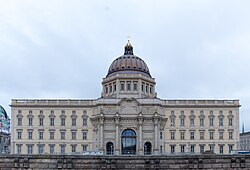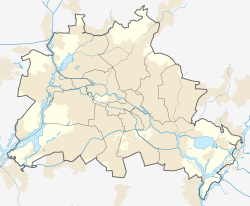
Back Museu Etnològic de Berlín Catalan Ethnologisches Museum (Berlin) German Museo Etnológico de Berlín Spanish Musée ethnologique de Berlin French המוזיאון האתנולוגי (ברלין) HE Museum Etnologi Berlin ID Ebe Ngosi Ihe Mgbe Ochie nke Berlin IG Museo etnologico di Berlino Italian Ethnologisches Museum Dutch Ethnologisches Museum NB
 | |
Location of Ethnological Museum in Berlin, Germany | |
Former name | Museum für Völkerkunde Berlin-Dahlem |
|---|---|
| Established | Original in 1873, new building in 1886, and after World War II rebuilt in present form in 1970 |
| Location | Mitte |
| Coordinates | 52°31′03″N 13°24′10″E / 52.5175°N 13.402778°E |
| Type | Ethnological |
| Director | Viola König |
| Website | Ethnologisches Museum |

The Ethnological Museum of Berlin (German: Ethnologisches Museum Berlin) is one of the Berlin State Museums (German: Staatliche Museen zu Berlin), the de facto national collection of the Federal Republic of Germany. It is presently located in the Humboldt Forum in Mitte, along with the Museum of Asian Art (German: Museum für Asiatische Kunst). The museum holds more than 500,000 objects and is one of the largest and most important collections of works of art and culture from outside Europe in the world.[1] Its highlights include important objects from the Sepik River, Hawaii, the Kingdom of Benin, Cameroon, Congo, Tanzania, China, the Pacific Coast of North America, Mesoamerica, the Andes, as well as one of the first ethnomusicology collections of sound recordings (the Berliner Phonogramm-Archiv).
The Ethnological Museum was founded in 1873 and opened its doors in 1886 as the Royal Museum for Ethnology (German: Königliches Museum für Völkerkunde), but its roots go back to the 17th-century Kunstkammer of the rulers of Brandenburg-Prussia.[2] As the museum’s collections expanded in the early 20th century, the museum quickly outgrew its facility in the center of Berlin on Königgrätzer Straße (today named Stresemannstraße).[3] A new building was erected in Dahlem to house the museum’s store rooms and study collections. In the Second World War, the main building of the museum was heavily damaged. It was demolished in 1961, and the buildings in Dahlem (in what was then West Berlin) were reconfigured to serve as the museum's exhibition spaces.
Following German reunification, although many of the Berlin museum collections were relocated, the collections of the Ethnological Museum remained in Dahlem. Starting in 2000, concrete plans were developed to relocate the collections back to the center of the city. In 2021, the Ethnological Museum and Museum of Asian Art were reopened in the Humboldt Forum in the reconstructed Berlin City Palace (German: Berliner Stadtschloss) immediately south of the main Museum Island complex.
© MMXXIII Rich X Search. We shall prevail. All rights reserved. Rich X Search

